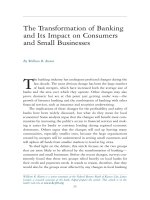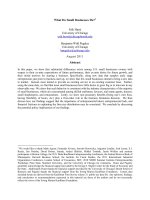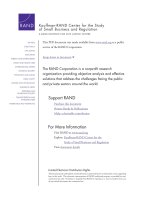SMALL BUSINESS
Bạn đang xem bản rút gọn của tài liệu. Xem và tải ngay bản đầy đủ của tài liệu tại đây (1.94 MB, 31 trang )
GROUP 8
SMALL BUSINESS
SMALL BUSINESSES CAN
MOTIVATE WITHOUT BIG
COSTS
MCGEGOR’S THEORY X AND THEORY Y
THEORY X
THEORY Y
OUCHI’S THEORY Z.
GOAL- SETTING THEORY AND MANAGEMENT BY
OBJECTIVES.
MEETING EMPLOYEE EXPECTATIONS: EXPECTANCY
THEORY.
REINFORCUNG EMPLOYEE PERFORMANCE:
REINFORCEMRNT THEORY.
TREATING EMPLOYEES FAIRLY: EQUITY THEORY.
BUILDING TEAMWORK THROUGH OPEN
COMMUNICATION.
MOTIVATION IN THE FUTURE.
MCGREGOR’S THEORY X AND
THEORY Y
Douglas McGregor (1906–1964) was a
Management professor at the
MIT Sloan School of Management and
president of Antioch College from
1948 to 1954.
In his 1960 book, The Human Side of
Enterprise, Douglas McGregor
proposed two theories by which to
view employee motivation. These
theories are Theory X and Theory Y.
Assume that employees dislike work and avoid
responsibility.
Must therefore be coerced into pursuing
organization’s goal.
Theory X similar to Taylorism /scientific
management.
T
H
E
O
R
Y
X
- Assume that employees take a
voluntary, active interest in their
work.
- Employees don’t view work as a
burden imposed on them.
Management makes a relaxed
managerial atmosphere for workers to
go beyond the goals set by
management.
Employees are given empowerment.
THEORY Y
- Definition.
- It is a real motivator if the management
follows three steps:
Find out what people think the problems
in the organization are.
Let them design the solutions.
Get out of the way and let them put those
solutions into action.
EMPOWERMENT
TYPE J( JAPANESE)
1. Lifetime employment.
2. Consensual decision making.
3. Collective responsibility.
4. Slow evaluation and promotion.
5. Implicit informal control.
6. Nonspecialized career paths
7. Holistic concer for employees.
There are 2 types of management approach: type American (type A)and type Japanese ( type j)
OUCHI’S THEORY Z
TYPE A( AMERICAN)
1. Short-term employment
2. Individual decision making.
3. Individual responsibility.
4. Rapid evaluation and promotion.
5. Explicit formalized control.
6. Specialized career paths.
7. Segmented concern for employees.
Theory z come out of Japanese management and stresses long –term employment,
collective decision making, individual responsibility , slow evaluation and promotion
,implicit, informal control with explicit control, moderately specialized career path, and a
holistic concern for employees
GOAL-SETTING THEORY AND MANAGEMENT BY OBJECTIVES









